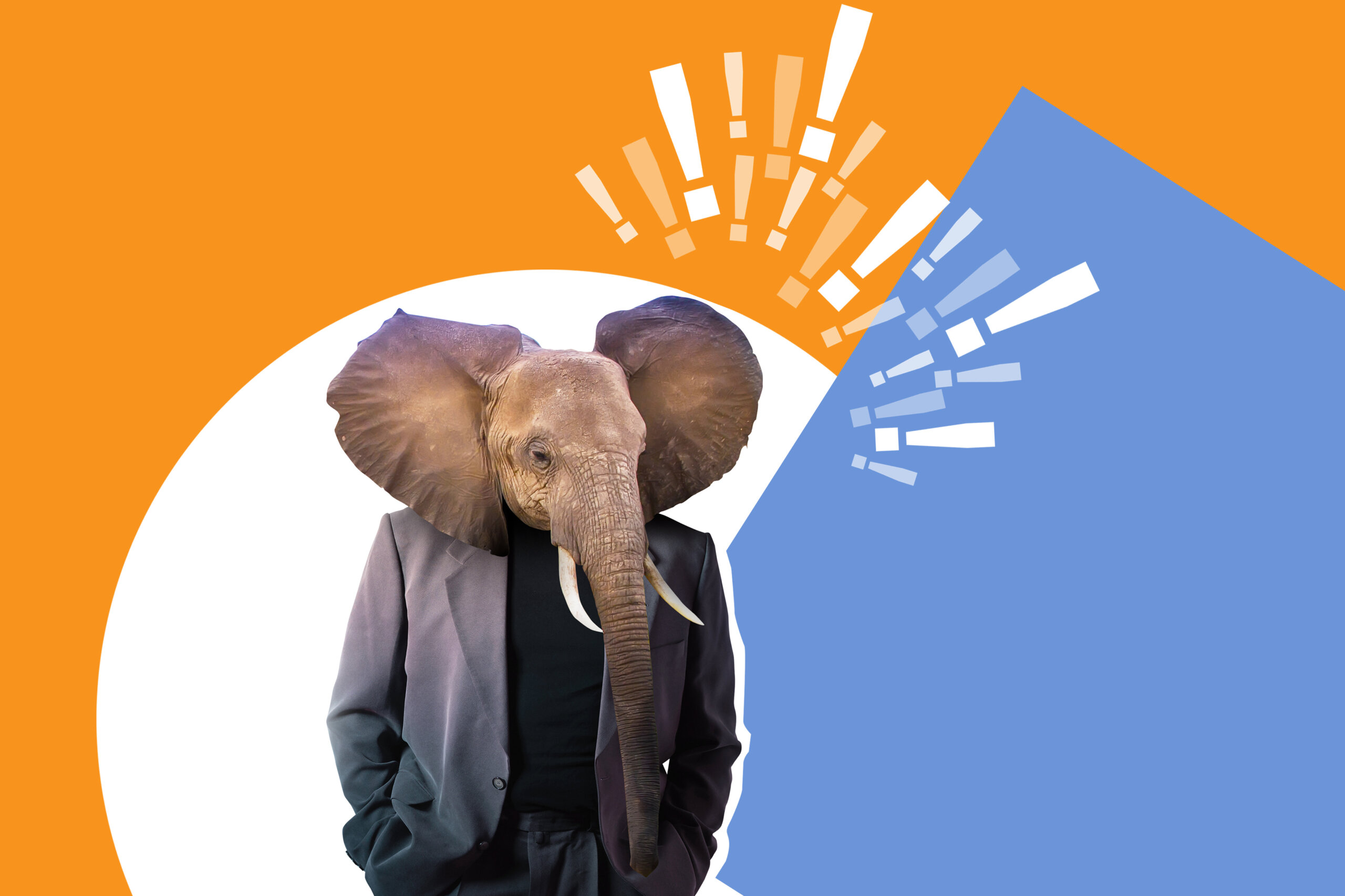One must be an elephant to work in an innovation lab

Looking back, this last year has once again been very challenging yet ambitious for Nido, the innovation lab for the Belgian public sector. We have racked up a number of successful and exciting achievements. Yet getting there in the face of a tenacious status quo has, all too often, required a Herculean effort from our staff.
This made me reflect on how the lab and its staff should best act and react in order to move things forward more smoothly in an environment that is so complex and, at times, stubborn and resistant to innovation. As the need to have “elephant skin” has become ever more frequent in our team discussions, I decided to take a closer look into the origins of the expression. To my surprise, the elephant world provides some interesting inspiration as well as quite a few insights about working in an innovation lab.
Leave an elephant-sized footprint
When digging for water elephant leave a “miniature biotope” or a pool of vital water for other animals.
In the same way, innovation lab staff consistently strive to set a good example of entrepreneurial behaviour, paving the way for the others to follow. In order to be credible, an innovation lab needs to first and foremost know how to innovate.
Second, but no less important, the lab needs to be able to communicate this knowledge to client partners in a compelling way. This has always been central to Nido’s approach – we seek to act as an innovation facilitator for our client partners. At the same time, we aim to combine this role with that of innovation actor, which entails taking an active lead. As facilitators we bring innovators in the private and the public sector together to work on concrete challenges. We accompany experiments to ensure that they lead to meaningful results. As actors we ourselves work on meaningful challenges and show that a new approach opens perspectives to pave the way for others. This is why our lab chose to invest significant energy and resources in the initiative “Gov Buys Innovation”. This initiative aims to makes experimentation with innovative solutions easy for the public sector. For example, procurement practices and legislation are often perceived as irreconcilable obstacles for civil servants and innovative companies. Gov Buys Innovation helps to overcome these hurdles by allowing innovation labs like Nido to work as both an innovation facilitator and actor.
Use your elephant brain
Elephants are able and willing to radically change their behaviour.
Highly social and clever, elephants rank highly among the world’s most intelligent creatures, able and willing to change their behaviours to adapt to changes in the environment. In the same way, innovation lab staff need to work to understand their environment and work in new ways to tackle challenges. Staying humble and conscious of the fact that our knowledge is limited, allows innovators to look at new solutions in an open way. This way of critical thinking and exploring new paths is essential for an innovation lab. That is the reason why we take the time to understand and formulate a problem before acting on it. In essence, this is the problem-oriented approach centering innovation on users and co-creating with them. Just as elephants, it is crucial for innovators to be problem solvers. Nothing should be considered inconceivable. At our lab we believe that every problem can be reframed as a challenge to be solved, as long as one is willing to solve it and remains open minded and ready to acknowledge when to ask for help.
Keep your elephant ear to the ground
Elephants hear low frequencies that are inaudible to humans.
Elephants have poor vision, but they have a sublime sense of smell and excellent hearing and use their trunks to explore the ground ahead of them as they walk. Like elephants, innovation lab staff also need to be willing to discover low frequencies, in order to look for real underlying problems and challenges. Listening, asking concrete questions, doing desk research, talking to stakeholders and daring to address taboos, all help getting to the heart of an issue and to the real needs linked to it. An innovation lab has to work on relevant and topical issues that are linked to their organisational strategy, far beyond mere “innovation theatre” where the term “innovation” is used loosely for publicity purposes. If we want to be successful, we need to work on issues that matter. This year for instance, Nido facilitated a pilot on the topic of the radical changes facing employees in the public sector in the near future. On the one hand, organisations want to foster the competencies of the future to become more innovative. On the other hand, given the pace of technological advancement, they need futureproof staff who may otherwise fast become obsolete.
Develop a very thick skin
Elephants have very thick skin to protect themselves from the environment and store the resources they need (vital water).
Often innovators will need elephant skin to endure and overcome the resistance coming from within their own institution. An innovation lab’s purpose is to bring change, when many prefer the safety of the status quo. But take comfort in the following: often the harsher the resistance, the more one knows one is working successfully, and on topics that really matter. Fake news, hostility, mockery, are all part of making change happen. Expect it, learn how to deal with it, and move forward with a positive attitude.
Remember however, that thick elephant skin is also rather sensitive. Indeed, the struggle for innovation in the public sector can be long and arduous. In order to keep momentum, it is important for innovators to regularly recall their basic principles and values, show tangible results, connect and communicate transparently with peers, and to remember why they chose this role.
Build a supportive herd
Elephant communities thrive because members take care of each other.
Elephant herds can consist of more than 100 members. They are led by an experienced, often particularly large and strong elephant cow. In the same way, social cohesion and guidance are also necessary for innovators.
As in any team, the strength of an innovation lab not only depends on the members themselves, but also on their synergy. Working together in a safe environment, constantly giving and accepting feedback and supporting each other is essential for an innovation lab with a very challenging mission in the public sector.
The public sector needs the elephant in the room
Dare to ask the questions that all too often go unasked.
Nido created an innovation network which has helped develop the lab’s role as both knowledge broker and matchmaker. Knowledge is scattered across the public sector, and Nido is taking it upon itself to try to create cohesion. By getting to know each other, sharing experiences and supporting peers, such a network creates the right space for change to happen. We can feel the constant support of fellow innovators who share the same fate. This support and the positive responses from partners are what keeps us going. It may not always be easy for civils servants to have us there and to consider the questions we raise, but the public sector needs this elephant in the room.
Conclusion
Working in an innovation lab can be quite challenging. It requires elephant skin and the support of the herd to thrive. By using your elephant brain, keeping your ear close the ground and being receptive to low frequencies, you are leaving footprints that create paths for others to use in their quest for public sector innovation.
Sometimes you might feel like the elephant in the room but accept this fate. The public sector needs you.





